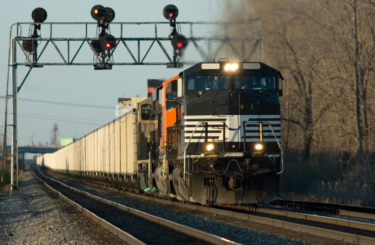
Are Railroad Injury Damages Taxable as Compensation?
The U.S. Supreme Court is set to decide a Minnesota case with nation-wide tax consequences for railroad companies and injured railroad workers who are awarded lost wages.
The question presented in BNSF Railway Co v. Loos is significant: whether payroll taxes are deductible from the amount owed an employee for lost wages in connection with an on-the-job personal injury. The issue is a pressing one, given that more than 4,000 railroad worker injuries occur each year, involving millions of dollars in lost-wage payouts.
While both state and federal courts across the country have already addressed the question, the courts have produced conflicting answers. Now, the U.S. Supreme Court is ready to settle the matter once and for all, having placed the appeal on its October 2018 docket.
Railroader Injury Damages
Michael Loos worked as a brakeman, switchman, and conductor at BNSF Railway for 15 years. In 2010, he injured his knee in BNSF’s train yard and missed several months of work. Loos was fired two years after the injury, reportedly for having too many absences.
Loos filed a lawsuit against BNSF, alleging it was liable under the Federal Employers Liability Act (FELA) for negligently causing his knee injury. He also brought a whistleblower retaliation claim under the Federal Railroad Safety Act (FRSA), asserting he was dismissed, in part, because he had testified on behalf of two former co-workers in a retaliatory discharge case.
A Minnesota federal district court dismissed Loos’s FRSA claim. However, his FELA claim went to trial, and a jury awarded him more than $126,000 in damages ($85,000 for past pain, disability, and emotional distress; $30,000 for lost wages; and $11,212.78 for past medical expenses).
Subsequently, BNSF asked the trial court to offset Loos’s lost wages by the amount of taxes owed under the Railroad Retirement Tax Act (RRTA). The court denied the request, finding that no RRTA tax was owed. BNSF then withheld the amount of the disputed RRTA taxes from Loos’s payment, asserting it had paid $3,765 to the Internal Revenue Service as his share of payroll taxes.
On appeal, the Eighth Circuit affirmed the decision, finding that Loos’s railroad injury award was not taxable under the RRTA.
A Railroader’s Lost Wages Aren’t “Compensation”
In its opinion, the Eighth Circuit explained that, while damages for lost wages are paid to an individual, the RRTA considers it “compensation” only if it is paid for “services rendered as an employee.”
Looking at the language of the RRTA, the Eighth Circuit said that damages for lost wages are not payment for “services rendered.” Rather, damages for lost wages “compensate the employee for wages the employee should have earned had he been able to render services.”
The Court further observed that Congress included pay for time lost in the definition of “compensation” in the Railroad Retirement Act (RRA) while omitting it from the RRTA’s definition of “compensation.” This omission suggested that Congress “did not intend the RRTA to include pay for time lost,” the Court said. “We are not convinced that we should import from the RRA the very language Congress eliminated from the RRTA.”
Other Railroader Injury Compensation Rulings
The U.S. Sixth Circuit, which includes Michigan, has also addressed the taxation question. In Hance v Norfolk Southern Railway Co, the Sixth Circuit held that the RRTA requires employers to pay taxes on all compensation, including payments for lost wages, and that payroll taxes should be paid on an award to a railroad employee.
Notably, Hance involved a wrongful discharge claim and not a personal injury award. The employee had been awarded back pay and ordered reinstated to his former position with the railroad company, resulting in the railroad’s reporting of RRTA compensation.
Meanwhile, the Iowa and Nebraska state supreme courts have said the language of the RRTA is unclear as to whether lawmakers intended to include time lost in the definition of “taxable compensation.” Ultimately, both courts found that awards for lost wages are taxable.
The Missouri Supreme Court has ruled otherwise, relying on the exclusion of federal income taxes for personal injury awards. And currently, the same taxation question is pending before the Alabama and Illinois appellate courts.
In its petition asking the U.S. Supreme Court to hear the case, BNSF claimed the discord among the federal and state courts had created an “untenable” situation, particularly because BNSF has operations and railroad workers in 28 states. We will continue to monitor the case and report back when the Supreme Court renders a decision.
If you’re a railroader who has suffered an on-the-job injury or employment issue, contact Sommers Schwartz today. Our personal injury lawyers are skilled and experienced in the specific railroad laws that protect you.
Ben Wilensky
Ben focuses on representing railroad workers seeking compensation for injuries under the Federal Employers’ Liability Act. He also represents clients in professional malpractice, civil rights, products liability, fraud litigation, governmental liability, RICO, business disputes and employment law.





